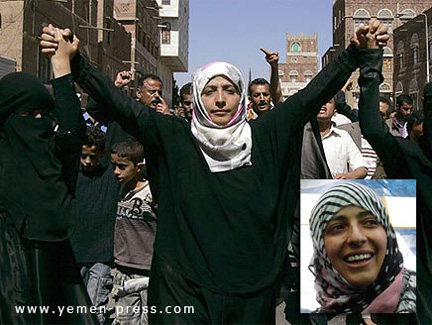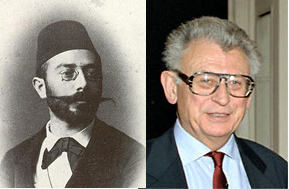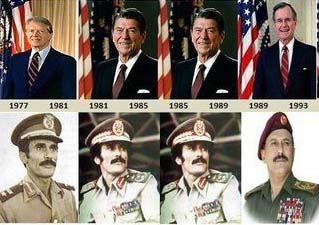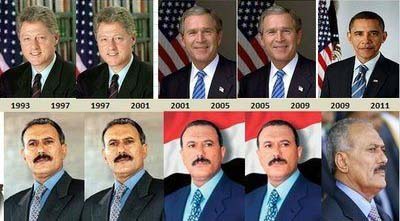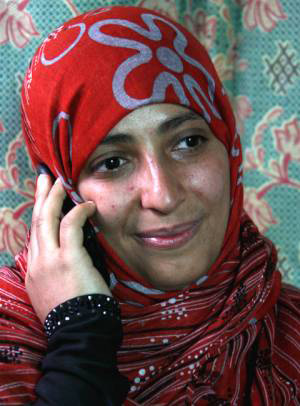
Tawakkul Karman
Yesterday I wondered how the Yemeni party Islah would respond to the Nobel Prize being given to one of its members. Here is the official letter, congratulating her, sent to Karman from Muhammad Abdullah al-Yadumi,
بسم الله الرØمن الرØيم
الأخت المناضلة / توكل عبدالسلام كرمان
رئيس منظمة صØÙيات بلا قيود, عضو مجلس شورى التجمع اليمني للإصلاØ
تØية وتقدير وبعد :
بكل ابتهاج تلقينا ÙÙŠ التجمع اليمني Ù„Ù„Ø¥ØµÙ„Ø§Ø Ø¥Ø¹Ù„Ø§Ù† Ùوزكم بجائزة نوبل للسلام كأول امرأة عربية تØظى بهذا التكريم وأول شخصية يمنية ØªÙ…Ù†Ø Ù‡Ø°Ù‡ الثقة الدولية الهامة.
إننا ونØÙ† نهنئكم بهذا الإنجاز التاريخي نعتبر هذا الÙوز مكسبا للثورة اليمنية السلمية وللمرأة اليمنية المناضلة والواعية القادرة على صنع Ø§Ù„Ù†Ø¬Ø§Ø Ø±ØºÙ… عوائق التخل٠وموروثات الإستبداد التي Øالت بين شعبنا وبين الإبداع لعقود من الزمن.
كما أن تكريمكم اليوم بجائزة نوبل للسلام يعد تتويجا مستØقا لجهود سنوات من نضالكم السلمي الدؤوب وكÙاØكم المرير ضد منظومة الجهل والظلم والÙساد ÙÙŠ مختل٠الميادين الإعلامية والØقوقية والسياسية ونصرة المظلومين وغيرها من المجالات وصولاً إلى العمل الثوري السلمي الذي مازال شعبنا برجاله ونسائه وشبابه وشيوخه يخوضه دون استكانة أو لين Øتى يتØقق له ما يصبو إليه من Øرية وكرامة وعدالة ÙˆØكم رشيد .
كما أننا نرى ÙÙŠ هذا التكريم شهادة أممية على Øضارية شعبنا اليمني وعدالة مطالبه وسلامة نهجه السلمي ÙÙŠ التغيير، متمنين ÙÙŠ هذا السياق ان يراÙÙ‚ هذا الإعترا٠من المجتمع المدني الدولي بعدالة المطالب اليمنية إعترا٠سياسي دولي بهذه المطالب وان يسارع العالم بأسره الى الوقو٠مع الشعب اليمني التواق للØرية والتغيير.
نكرر تهانينا الصادقة لكم ولكل ذوي المبادرات الرائدة ÙÙŠ وطننا الØبيب ØŒ مع تمنياتنا لكم بالتوÙيق ÙˆØ§Ù„Ù†Ø¬Ø§Ø ÙˆÙ…Ø²ÙŠØ¯Ø§Ù‹ من العطاء.
والسلام عليكم ورØمة الله وبركاته،،
أخوكم /
Ù…Øمد بن عبدالله اليدومي
رئيس الهيئة العليا للتجمع اليمني للإصلاØ




